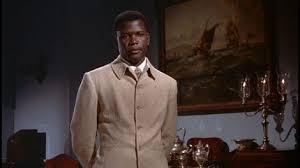Band of Angels
The film Band of Angels is a film that was released in 1957. The plot took place during the last year of the antebellum period. Written about a woman named Amantha Starr, the daughter of a Kentucky plantation over, who finds out after her father's death that her mother was one of his slaves making her half-black. After this, she is sold as a slave to go work for a man in Louisiana. She ends up falling in love with him until she finds out about his involvement with the slave trade.
Throughout this film, there are multiple notable slaves that are all portrayed very similarly. The first is his housekeeper Michelle who was also his former lover. Next, a man by the name of Ru-Ru is basically Bond's right-hand man.
What I find most interesting about this film is the way that Bond treats his slaves. Unlike most slave owners at the time Bond treated his slaves very kindly. He did not physically harm them or bestow any sort of physical punishment to them. Despite this fact, Ru-Ru still resented Bond. I found that to be the most notable part of the film. Ru-Ru claimed that Bond was using his kindness to still basically manipulate and control his slaves, just in a different way than other slave owners. Ru-Ru's argument was that Bond's kindness would force the slaves to submit to his will because of their knowledge of the way that most slaves were being treated. He claimed that Bond's kindness was equivalent to him controlling his slaves with fear.
Looking past the romantic aspect of the movie, the way Ru-Ru views Bond is different than the way he is portrayed to the viewer. In the viewer's eyes Bond is seen as a good guy. From when he was first introduced on-screen he was played to be a decent guy. From when he first purchased Amantha to the way he is seen treating his slaves he was written to be good. This is opposite to the way that Ru-Ru views Bond.






Comments
Post a Comment